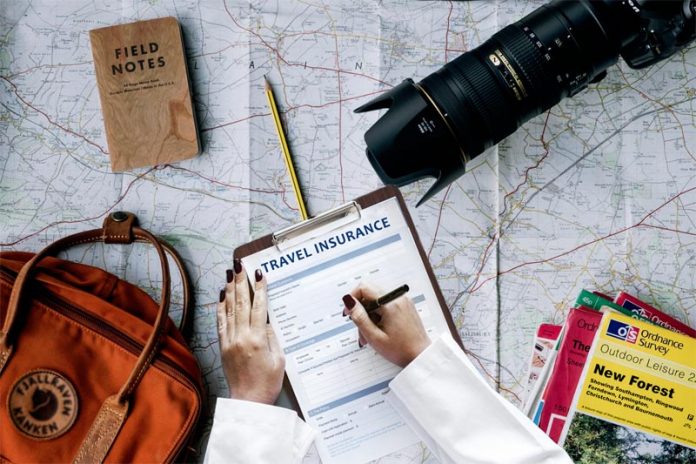
Updated: March 07, 2020
How much travel insurance is sufficient? When should you buy travel protection and what you need to know?
Recent global travel lockdown, ban or restrictions to curb the coronovirus (COVID-19) spread, and the tragic Ukrainian air crash has sparked interest in travel insurance.
It is an optional add-on that virtually every airline, cruise line, tour operator, travel agency or online booking site offers when you book a travel element.
Read the fine print. You may notice that not every policy provides sufficient travel protection you need, resulting in expensive surprises when you need to make a claim. Proactive action can alleviate financial burdens for you and your family.
Some employment extended health insurance and credit card companies offer coverage. Benefits are limited. From personal experience, purchasing a comprehensive travel insurance policy is well worth it.
When do you buy travel insurance? When you take an out-of-province trip and your provincial medical plan does provide you enough coverage. Or you are travelling abroad.
“You should buy the best travel health insurance you can afford before you leave,” even for a day trip to the United States, states travel.gc.ca.
Limited Canadian Provincial Health Plan Coverage
British Columbia Health Care coverage is limited to 75 Canadian dollars a day for “Emergency Hospital Care” for travel in Quebec or abroad.
Alberta only pays for “General” or “Auxillary Hospital” not private hospital services for travel abroad. Ontario government does not provide medical insurance coverage for travel abroad, except for kidney dialysis.
Quebec residents have a more generous coverage. Check with your provincial health care office on the latest update.
Golden Rules: What You Need to Know
Do your research and always buy from a licenced insurer. Prices and coverage can differ significantly.
It is important to know who underwrites the travel insurance. Find out about the underwriter‘s reputation, efficiency in processing a claim and providing emergency help.
The golden rules according to Travel Health Insurance Association of Canada: know your health, trip, policy and rights.
Health
Do you have pre-existing health conditions? Consult your doctor and plan early. Some policies require you to be “medically stable” over a designated time period. You may need to buy a pre-existing condition waiver.
Trip
Where, for how long, and the type of activities. Your claim will be invalid if a formal government travel advisory and/or warning to “Avoid All or Non-Essential Travel” is posted before your insurance purchase.
Check with Global Affairs Canada and/or Public Health Agency of Canada or your government agency on the latest travel advisory.
Would you be participating in extreme sports, e.g. scuba diving, mountain climbing or downhill skiing? Are you be able to extend your policy while on your trip?
Policy
Type of policy and coverage. Read the fine print carefully. Common policies include travel medical insurance, trip cancellation and interruption, baggage and air travel related expenses.
“Trip cancellation and interruption” policy provides protection from weather and unforeseen circumstances, such as, unexpected illness, hurricane, earthquake, civil unrest or a missed flight connection.
It is best to buy the policy at the time of your travel purchase as some trip elements are non-refundable.
You can’t claim for a missed connection if it’s your fault. Or denied entry to a country or your visa application is declined. Some may cover health epidemics, such as the COVID-19 outbreak.
In the case of the COVID-19 outbreak, you can file a claim. If the airline cancel or postpone a portion of your flight to your final destination. You can also claim for your hotel and tour bookings cancellation due to the flight suspension.
Your government’s travel advisory and/or warning states to “Avoid All or Non-Essential Travel” to your travel destination: a specified region or the entire country.
There is also a time frame when the travel advisory applies to your trip cancellation claim. It can be within two to seven days prior to your trip departure, depending on your insurer.
Insurance will only reimburse you for the “non-refundable prepaid portion” of your trip expense. It can take up to a month or more for reimbursement.
The airline, hotel or tour company must provide you a written cancellation notice.
“Cancel for any reason” policy is usually an “add-on” offer to a comprehensive travel insurance plan.
The policy allows you to cancel for any reason, such as, your concern over the COVID-19 outbreak or exclusions not covered in the “trip cancellation and interruption” policy.
With the policy, you would save some pre-paid trip expenses if you are denied entry to a country or your travel visa declined.
The insurer normally requires at least 48 to 72 hours trip cancellation notice before your departure date. You may receive from 50 up to 80 per cent reimbursement for the non-refundable portion of your travel purchases.
Rights
You can cancel your policy within the 10 days “Free Look” period if you bought it from a Canadian insurer. Before You Pay, ensure your policy states a full refund and your coverage limit is enough.
Beware of Key Policy Clauses
- Medical emergencies and evacuation: What is the treatment limit? Is full coverage provided for potential travel cost including a medical emergency trip back to your home country?
- Non-medical emergencies and evacuation: In an event of a health epidemic, such as the coronavirus outbreak, and your government orders mandatory evacuation. Would you be able to claim for evacuation and what is the limit?
- Stolen or lost luggage: Are your prescribed medication, equipment and valuables included? What is the limit?
- Emergency assistance: Is there a toll free help number to talk to an English speaker or a speaker of your native language?
- Repatriation: In the event of death, what travel cost is covered?
- Exclusions: What circumstances are NOT covered? Most policies exclude injuries or illnesses due to war, disease, radioactive contamination, engaging in unlawful act, legally drunk or under the influence of drugs, pregnancy and birth of a child.
In the recent Ukrainian airline crash, repatriation would be covered if passengers bought British Columbia Automobile Association (BCAA) travel medical insurance, said Meghan Hill, BCAA Senior Manager of Customer Experience in an email.
Related: Travel Checklist: Essential Things to Do Before Your Trip
For claims related to alcohol consumption, “claim decisions are based on the treating physician’s assessment or medical record evidence where the claim occurred, that sickness or an accident was caused by alcohol consumption, abuse or misuse,” she added.
Before you start pouring, check the legal blood alcohol limit in your travel destination
Drugs – Marijuana
Marijuana consumption is considered legal in Canada, but illegal in some countries. Your policy will not cover you if the laws of country you are visiting deemed your action as “engaging in unlawful act.”
Boarding Denial
Airlines have the right to deny boarding for “a passenger who could be suffering from any disease or physical or mental condition” that may be deemed a potential danger, requires medical attention or adversely affects other passengers and crew, or to the aircraft safety, according to the World Health Organization.
Hill said if flight boarding is denied due to sickness, “to make a claim, customers would need “cancellation insurance” and a doctor’s note advising them not to travel.”
Pregnant Travellers
Some travel insurance policies such as BCAA offers limited pregnancy coverage. Said Hill on BCAA’s policy, “Coverage may be provided during the first 31 weeks for complications of pregnancy.”
“The premature birth of a child may be covered if the birth occurred during the first 31 weeks of pregnancy.” She added medical expense coverage up to $20,000 may be provided to the mother and the newborn.
Free Legal Help for Low Income
Insurance policy fine print can be daunting. If you are unclear, ask your licenced insurer or seek legal help.
Lower income individuals can access free legal advice at accessprobono.ca or lslap.bc.ca. Alberta list: lawcentralalberta.ca/en/lower-income-albertans.
Have a complaint about your insurance provider? Find out how to file a complaint at Financial Consumer Agency of Canada or Insurance Bureau of Canada.
Travel medical insurance coverage is usually effective on the day of purchase. A waiting period applies for trip cancellation and interruption for travel elements bought prior to your insurance purchase.
Most countries require your passport to be valid for up to six months beyond your departure date from their country. It is a requirement for some travel insurance policies too.
Your family or friend should have a copy of your insurance policy before your trip departure. They can intervene in case of an emergency.
Ask your travel insurance company for a list of recommended high risk travel insurers if you are embarking on high risk adventures and trips to conflict or post-conflict areas.
Global Affairs encourages Canadians to register at their free service site: Registration of Canadians Abroad before leaving the country.
The government can notify you in case of a natural disaster, civil unrest or emergency at home or abroad. More on travelling abroad at travel.gc.ca








































